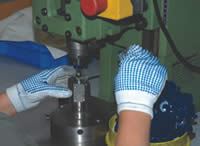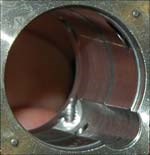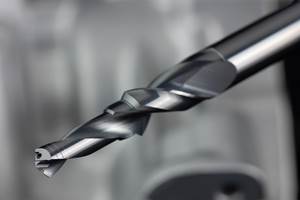Drill Reduces Machining Time, Increasing Capacity
This company specializes in developing electromagnetic systems with switching and/or sensor capabilities. Typical product applications include general mechanical engineering and plant construction; automotive engineering equipment and materials handling equipment; and automation, medical and power technologies.
Share





Kendrion specializes in developing electromagnetic systems with switching and/or sensor capabilities. Typical product applications include general mechanical engineering and plant construction; automotive engineering equipment and materials handling equipment; and automation, medical and power technologies.
Employing approximately 270 people, the company carries out development and production under one roof. The product portfolio includes standard and customized versions to meet customer-specific requirements. With a large portion of in-house production, subcontracting is restricted to basic materials, standard components and low-value turned components.
Heinz Jankowski, production manager at Kendrion, describes a drilling operation. Using series B401x Xtra-tec drills from Walter USA, Inc. (Waukesha, Wisconsin), the electro-magnet steel cases made of 12L12 steel can be drilled at a feed rate of 0.020 ipr, with bore diameters of 0.709" and 0.827" and a drilling depth of 1.25".
Prior to purchasing the Xtra-tec drills, the company could only achieve 0.004 ipr using drills with two indexable inserts. The higher feed rate from the new drill is partly the result of an exchangeable two-effective tip. Like conventional HSS and solid carbide drills, the new drill simultaneously uses two cutting edges, which results in optimal distribution of forces, along with stability and good cutting performance, the manufacturer says.
The tool's design pays particular attention to the location of cutting bits. One Torx-plus screw clamps the bit into a prismatic seat. The repeat accuracy is within the range of 0.001 inch. Other features of the tool include a PVD-coated high-performance material and the WXP45 cutting material. With this material, the positive cutting edge geometry of the bit achieves soft cutting action and low cutting force.
"The Xtra-tec drill enables us to save as much as 12 to 16 seconds on each bore, depending on the application," says Mr. Jankowski. "Considering that annual production is at least 50,000 components, there is the potential for noticeable time savings."
The indexable insert drill previously used required 14.4 seconds to complete the operation. The number of components for each cutting edge was around 400. Because the insert could be indexed four times, 1,600 components could be machined by each insert.
Example 1: D=0.709",
Drilling Depth 1.25", Quantity: 50,000
Indexable Insert Drill Xtra-tec B401x
Vc 390 f/min 456 f/min
n 2,100 rev./min 2,400 rev./min
f 0.004 in/rev. 0.020 in/rev.
Q 0.007 in3/min 0.044 in3/min
te 14.4 sec 2.5 sec
Number of components machined: 1,600 /insert (indexing 4 times) 2,000/cutting bit
Using the new drill, each bore requires 2.5 seconds, and the number of components machined by each cutting bit has increased to 2,000.
Kendrion also incorporated the drill with a workpiece that is an electromagnet casing of the same material. However, the drill (hole diameter is 0.827 inch) has to penetrate into an existing parallel, small diameter bore. This operation is challenging because of the interrupted cut. For this operation (drilling depth is 1.65 inches), the indexable insert tool took 19.6 seconds.
The new drill takes 2.7 seconds, which represents about the same time required for a "normal" bore without an interrupted cut, the company says. Because the indexable insert drill features more effective cutting edges, the number of components machined is about the same for both tools.
The Xtra-tec can virtually eliminate chatter during an interrupted cut, so no additional vibration is produced on the turning center. "Because of the soft cutting action, the machine is subjected to less stress than we experienced with indexable insert drills," explains Volker Ernst, Walter field sales engineer.
According to Kendrion, the purchase price for the new drill is slightly higher than the previous tool. However, the tool's performance compensates for the disparity. With an annual production of 50,000 components (with hole diameters of 0.709 inch) and 120,000 components (with hole diameters of 0.827 inch, interrupted cut), the gain of time is 166 hours and 560 hours, respectively.
"We have proven that high productivity can be attributed primarily to maximum feed rates," says Mr. Ernst. "We have found that tool costs, as a portion of production costs, typically represent about 4 percent."
Example 2: D=0.827",
Drilling Depth 1.65", Quantity: 120,000
Indexable Insert Drill Xtra-tec B401x
Vc 369 f/min 456 f/min
n 1,700 rev./min 2,100 rev./min
f 0.003 in/rev. 0.020 in/rev.
Q 0.006 in3/min 0.045 in3/min
te 19.6 sec 2.7 sec
Number of components machined: 800/insert (indexing 4 times) 800/cutting bit
In the current situation, tool costs are offset through reducing non-productive time. "The purchase price for the indexable insert drill is lower, but the service life of each insert is shorter," explains Mr. Jankowski. "Therefore, additional time is required for indexing and changing inserts."
"Creating more capacity reduces the number of components that need to be purchased," he continues.
Electromagnets are high-precision components and require extensive in-house production. Kendrion only buys components if there is a bottleneck, and/or if the component's design is simple. All processes, including metalcutting and forming, winding and processing of plastics, as well as assembly work, are undertaken in-house. For this reason, reduction in processing time is essential, the company says.
"Depending on the quantity we need to make, we'll process other bore diameters using Xtra-tec drills," says Mr. Jankowski.
Related Content
Finding the Right Tools for a Turning Shop
Xcelicut is a startup shop that has grown thanks to the right machines, cutting tools, grants and other resources.
Read MoreKennametal's Expanded Tooling Portfolio Improves Performance
The company has launch eight new products that expand on and support existing platforms across multiple applications.
Read MoreEmuge-Franken's New Drill Geometry Optimizes Chipbreaking
PunchDrill features patent-pending geometry with a chipbreaker that produces short chips to control machining forces.
Read MoreAllied Machine Drill System Provides Enhanced Chip Evacuation
Eastec 2023: The T-A Pro drill body incorporates straight flutes designed for optimized coolant flow and rigidity.
Read MoreRead Next
5 Rules of Thumb for Buying CNC Machine Tools
Use these tips to carefully plan your machine tool purchases and to avoid regretting your decision later.
Read MoreBuilding Out a Foundation for Student Machinists
Autodesk and Haas have teamed up to produce an introductory course for students that covers the basics of CAD, CAM and CNC while providing them with a portfolio part.
Read MoreRegistration Now Open for the Precision Machining Technology Show (PMTS) 2025
The precision machining industry’s premier event returns to Cleveland, OH, April 1-3.
Read More

















.png;maxWidth=300;quality=90)

















